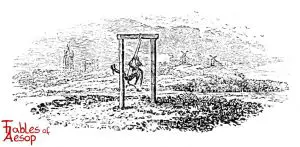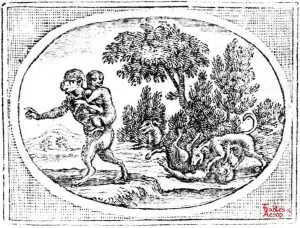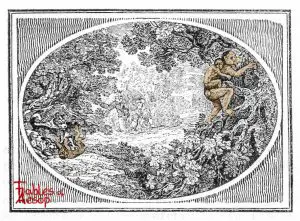An Ape had two babies. She lavished care on one and largely ignored the other. The ignored baby learned more about survival and did better in the world.
Sometimes it’s better to be an enemy rather than a friend.

JBR Collection
An Ape who had two Young Ones was very fond of one, and took but little notice of the other. One day, finding the Dogs after her, she caught up her pet in her arms, and ran off. Blind with fright, she knocked the Little One’s head against a tree, and dashed out its brains. The other Young One, who had clung by himself to his mother’s rough back, escaped unharmed.

Samuel Croxall
AN Ape having two young ones, was doatingly fond of one, but disregarded and slighted the other. One day she chanced to be surprised by the hunters, and had much ado to get off. However, she did not forget her favourite young one, which she took up in her arms, that it might be the more secure: the other, which she neglected, by natural instinct, leapt upon her back, and so away they scampered together. But it unluckily fell out, that the dam, in her precipitate flight, blinded with haste, dashed her favourite’s head against a stone, and killed it. The hated one, clinging close to her rough back, escaped all the danger of the pursuit.
THE APPLICATION
This fable is designed to expose the folly of some parents, who by indulging and humouring their favourite children, spoil and ruin them; while those, of whom they have been the least fond, have done very well. The child that knows it can command its parent’s affections, will hardly be brought to know how to obey. The fondness of indiscreet parents to favourite children is blind as love itself; they are so far from seeing any blemishes or imperfections in them, that their very deformity is beauty, and all their ugly tricks graces. Thus, without ever being checked and corrected tor their faults, but rather applauded and caressed for them, when they come abroad upon the theatre of the world, what rock will they not split upon? While the child who is so happy as to escape these very tender regards, these pernicious indulgencies, is obliged to be good and honest in its own defence. The parent looks upon it with an eye clear from the mists of fondness. He has no regard to its dislike or approbation; but, for his own credit, puts it into such a way of education as reason dictates; and forces it to be accomplished, as its capacity will admit.

Thomas Bewick
An Ape having two young ones, was dotingly fond of one, but disregarded and slighted the other. One day she chanced to be surprized by the hunters, and had much ado to get off. However, she did not forget her favourite young one, which she took up in her arms, that it might be the more secure: the other, which she neglected, by natural instinct, leapt upon her back, and so away they scampered together; but it unluckily fell out, in the over-anxiety of her precipitate flight, confused and blinded with haste, that she struck her favourite’s head against a branch, which threw it on the ground, where the darling bantling was seized by the dogs and killed. The hated one, clinging close to her rough back, escaped all the danger of the pursuit.
APPLICATION.
By dear mamma's o'er-weening fondness spoil'd, Car'ess'd and pamper'd, dies the fav'rite child: The boy she slights, rough, vig'rous, and well-grown, Unaided, bears the brunt, and shifts alone.
The indulgence which parents shew to their children arises from the most amiable of human weaknesses; but it is not the less injurious in its effects, and therefore it is of great importance to guard against it, and not to suffer a blind fondness to transport us beyond the bounds of a discreet affection, for this often proves the ruin of the child. This fable is also intended to expose the folly of a system of favouritism in families, for experience shews that those children who are the least pampered and indulged usually make the best and cleverest men.

Perry #218

